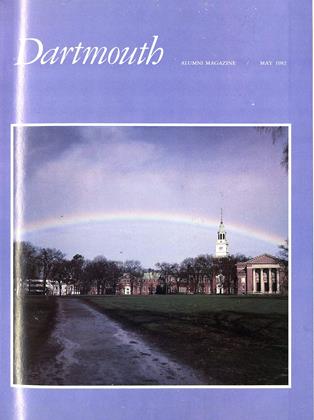Amid the snows of April, we hauled out a bundle of releases from the Dartmouth News Service to find out what's been happening here lately. Most of what we read was provocative; some of it was, frankly, kind of confusing. A sampling:
Rosalyn Yalow, a Nobel laureate in physics and medicine, came to town as a Montgomery Fellow. "All laureates knowledgeable in the field of physics," Yalow told her Dartmouth audience, "are in favor of nuclear power." There probably are only two who aren't, she said, and they "should know better." Yalow was also caustic about the disarmament movement.
David Dellinger, a former member of the Chicago Seven, appeared at Dartmouth to give a speech called "Reaganomics and the Nuclear Danger: The Rebirth of Resistance." He said he favored unilateral disarmament and that "it's clear supply-side economics isn't going to work."
Thomas Barthold, assistant professor of economics at Dartmouth, told a meeting of the local Dartmouth Club that the Reagan tax bill "is a solid framework for future growth in the American economy."
President McLaughlin, in a speech in Woodstock, Vermont, said that the Reagan Administration's budget proposals will have a disastrous effect on our system of higher education." McLaughlin, while agreeing that higher education should not be exempt from a general reduction in federal programs, said that "education seems to have been identified for disproportionate redress. He hoped a "groundswell of protest would reach Washington.
William A. Fischel, a member of the Economics Department at Dartmouth, charged that the National Agricultural Lands Study, established under President Carter, "vastly overstated the true rate of urban development of rural land."
John T. Scott, another Dartmouth economist, challenged the classic notion of economics that bigness in business stifles competition and causes high prices and therefore is bad.
Emanuel R. Sturman '70, placement officer at the College, reported that fewer companies are making recruiting visits to Dartmouth in this year's tight economy. Tuck School announced a similar decline. "However," Sturman said, "I would like to stress that the person who does a thorough job, parlaying skills acquired in college courses, extracurricular activities, and leave-time jobs into an attractive package can find employment."
Alice L. Donnelly, placement coordina- tor at Thayer School, reported that there has been more recruiting there by com- panies in search of engineers and "a tre- mendous response on the part of students."
John C. Schultz, research assistant professor of biology at Dartmouth, said his recent research suggests that trees, by producing varying amounts of chemicals in leaves, offer insects a set of damning choices tasty leaves and nasty ones. Forced to pick and choose, the insects move, the motion attracts predators, the insects are eaten. Trees, according to Schultz, probably have thus prevented the development of super-pests.
Dudley J. Weider, assistant professor of clinical surgery at the Medical School, described a new technique for repairing badly damaged eardrums. Working among Eskimo children in northern Alaska, Weider and a colleague developed tiny circular staples to secure grafts of muscle tissue to damaged eardrum remnants. The "take rate" among patients rose from 50 to 94 per cent. Now using the technique at the Dartmouth-Hitchcock Medical Center, Weider reported a 98 per cent success rate in 500 cases requiring surgery for perforated eardrum repair.
"My college life was so exquisitely happy that I should like to relive it in my son." Rufus Choate, class of 1819
 View Full Issue
View Full Issue
More From This Issue
-
 Feature
FeatureWhat keeps them going? A 'Mystic Glue' Perhaps
May 1982 By Dana Cook Grossman -
 Feature
FeatureTerrorism and the Niceties of Justice
May 1982 By Joseph W. Bishop Jr. -
 Feature
FeatureImpacts simply positive
May 1982 -
 Article
ArticleIn the Wide, Wide World
May 1982 By Peter Smith -
 Class Notes
Class Notes1964
May 1982 By Alexander D. Varkas Jr. -
 Class Notes
Class Notes1954
May 1982 By John L. Gillespie







